Poll: Use Clemency Power To Fight Mass Incarceration
New polling shows voter support for executive clemency and commuting prison sentences for many who can be safely returned to their communities.

New national polling from Data for Progress and The Lab, a policy vertical of The Appeal, shows that voters support using executive clemency as a tool to reverse decades of over-incarceration, and commuting prison sentences for broad categories of people who can be safely returned to their communities.
Even after decades of excessively long and discriminatory prison sentences in the United States, and amid growing consensus that we need to dramatically reduce prison populations, executive clemency remains a largely overlooked and underused path toward reversing the punitive excesses of mass incarceration. Grants of clemency need not be rare exceptions. As law professor Rachel Barkow wrote, for example, “clemency is a key tool for addressing poor enforcement decisions and injustices in [the criminal legal] system, as well as checking disparities in how different [prosecutors] enforce the law.” Yet that tool has fallen into disuse.
While momentum for sentencing reform has grown at both the state and federal level, American prisons remain filled with people serving lengthy, decades-long sentences, including those imposed in the 1990s and the early 2000s, when the punitive zeal of prosecutors, judges, and lawmakers was at its peak. As a result, the American prison population is aging, with growing proportions of incarcerated people in their 50s, 60s, and older who increasingly require expensive medical care and who are unlikely, if released, to commit future crimes. People also remain imprisoned for convictions that result in far shorter terms today, meaning people are caged, separated from their families and communities, for reasons we now accept cannot be justified.
The power to commute sentences and pardon convictions—held, at the federal level, by the president, and by virtually all governors or governor-appointed boards in the states—can efficiently reduce this over-incarceration, while also redressing racial injustice that pervades the criminal legal system, including in sentencing.
Our polling shows national support for using executive clemency in precisely this way. In particular, voters support commuting sentences of categorical groups based on age, health, time served, the nature of the offense, and as a means to reduce racial disparities and maintain consistency with current sentencing practices.
Commutations based on age & health:
- 67 percent of likely voters, including 75 percent of Democrats, 68 percent of independents, and 56 percent of Republicans, support commuting the sentences of people with chronic illnesses that require long-term care.
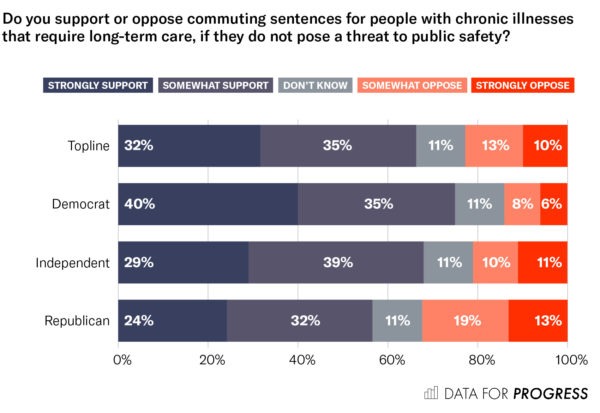
- 66 percent of likely voters, including 75 percent of Democrats, 66 percent of independents, and 55 percent of Republicans, support commuting sentences for people age 55 or older as a means to reduce prison populations.
America’s prison population is aging and now includes many who require constant medical care. For example, there are more than 61,000 people aged 55 or older who are serving life terms. On average, these people have already served 37 years behind bars. In the federal prison system alone, there are more than 20,000 people aged 56 or older.
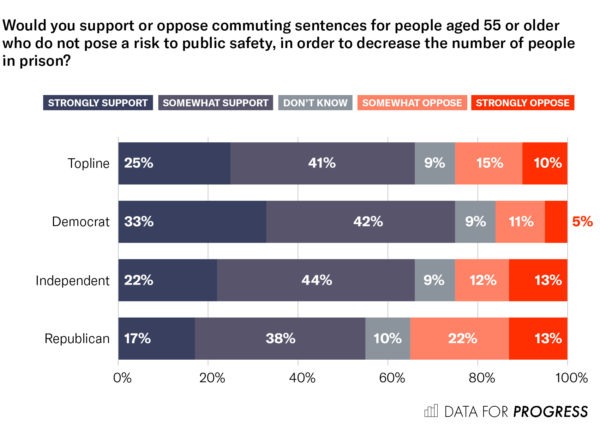
- Voters support commuting sentences based on current age and age at the time of the offense:
- 66 percent of likely voters, including 74 percent of Democrats, 66 percent of independents, and 56 percent of Republicans, support commuting the sentences of people over age 65.
- 61 percent of likely voters, including 73 percent of Democrats, 57 percent of independents, and 49 percent of Republicans, support commuting the sentences of people over age 50.
- 55 percent of likely voters support commuting the sentences of people who committed a crime when they were under 20.
- 53 percent of likely voters support commuting the sentences of people who committed a crime when they were under 25.
Research shows that people commit less crimes as they grow older, including people who may have committed crimes at a younger age. For example, arrest rates for violent crime are highest among teens. Of all people arrested, less than two percent are 60 years of age or older.
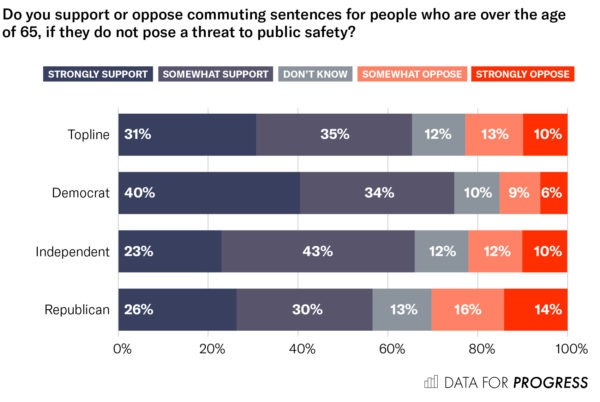
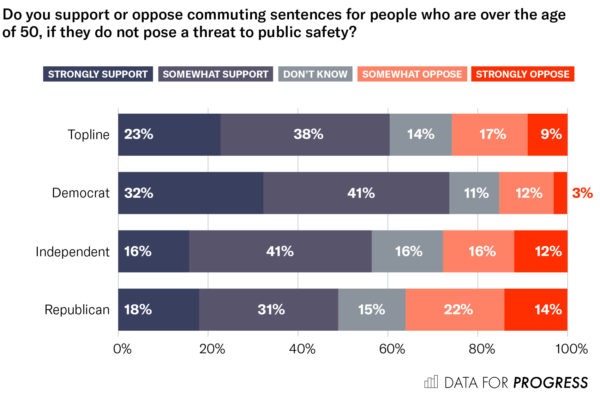
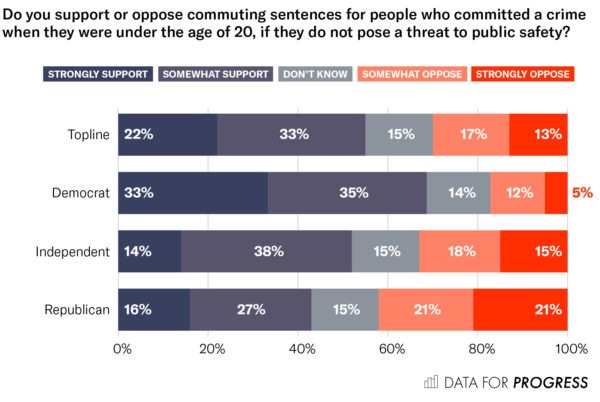
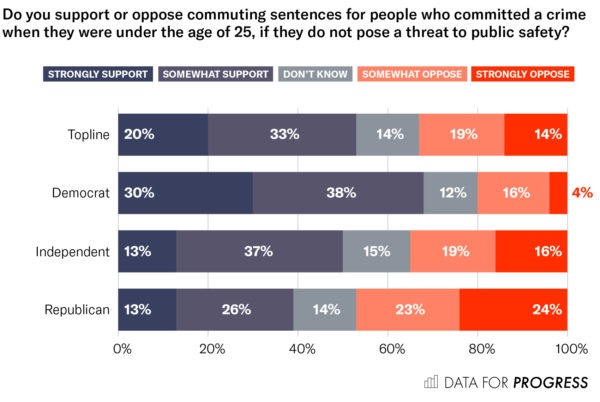
Commutations based on sentencing and racial injustice:
- 68 percent of likely voters, including 74 percent of Democrats, 66-67 percent of independents, and 62 percent of Republicans, support the president and governors commuting the sentences of those who are serving excessively long prison sentences.
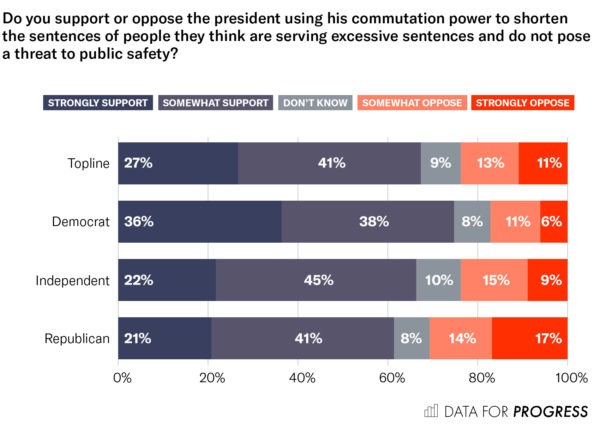
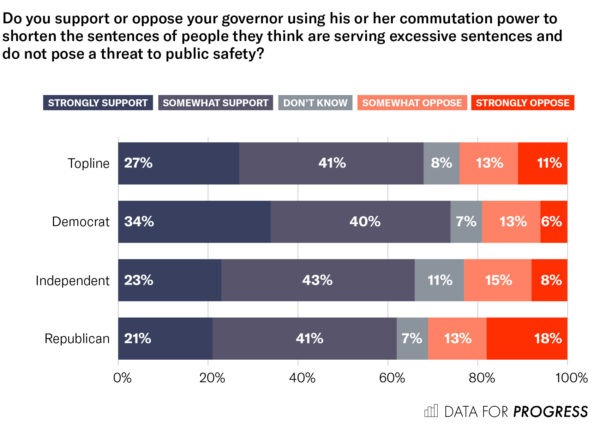
- 66 percent of likely voters, including 81 percent of Democrats, 63 percent of independents, and 51 percent of Republicans, support the president’s use of commutation power to address racial inequality in sentencing.
Research shows that, on average, in the federal criminal justice system, the sentences given to Black men are nearly 20 percent longer than those given to white men convicted of similar crimes.
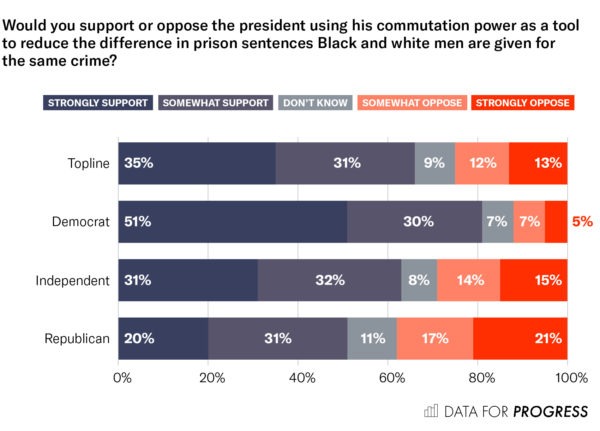
Commutations based on time served:
- 73 percent of likely voters, including 78 percent of Democrats, 78 percent of independents, and 65 percent of Republicans, support commuting the sentences for individuals who have already served more than what current law requires for that offense.
Many people in the United States are serving lengthy prison sentences for crimes that, under current law, would no longer be considered crimes or that would result in a much shorter prison sentence.
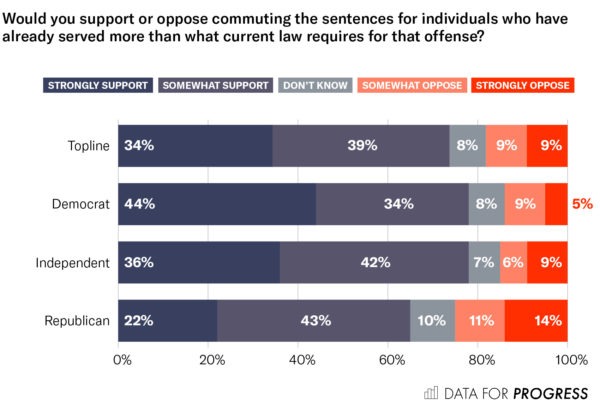
- Voters support commuting sentences based on time served:
- 53 percent of likely voters support commuting the sentences of people who have already served 20 or more years in prison.
- 50 percent of likely voters support commuting the sentences of people who are serving long prison terms because of sentence enhancements.
Research shows that long prison sentences do not discourage people from committing a crime or reduce the likelihood that someone will commit another crime after they are released.
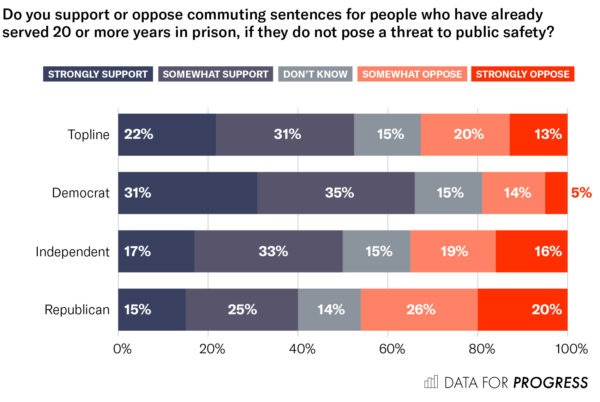
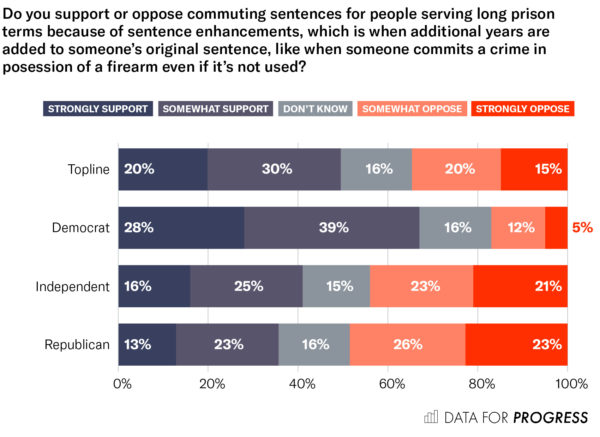
Commutations based on the nature of the crime:
- 66 percent of likely voters, including 79 percent of Democrats, 65 percent of independents, and 53 percent of Republicans, support commuting the sentences of people who did not cause death or bodily injury to anyone.
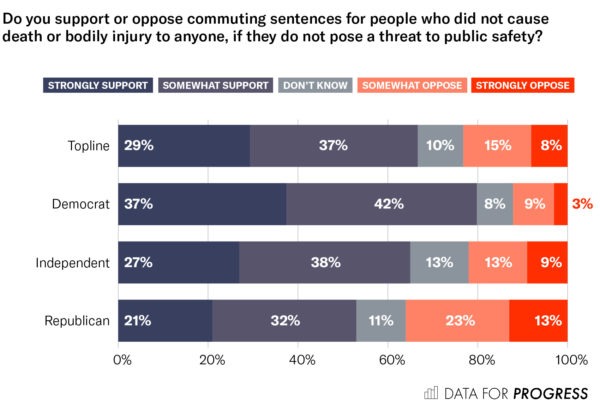
- 61 percent of likely voters, including 68 percent of Democrats, 64 percent of independents, and 50 percent of Republicans, support commuting sentences for people convicted solely of drug offenses.
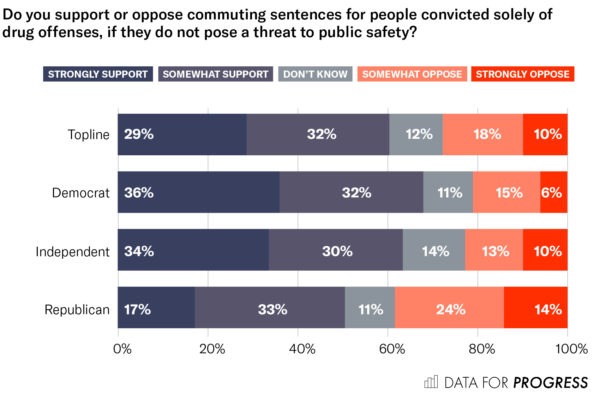
Polling Methodology
From April 16 to April 19, 2021, Data for Progress conducted a survey of 1138 likely voters nationally using web panel respondents. The sample was weighted to be representative of likely voters by age, gender, education, race, and voting history. The survey was conducted in English. The margin of error is ±3 percentage points.

